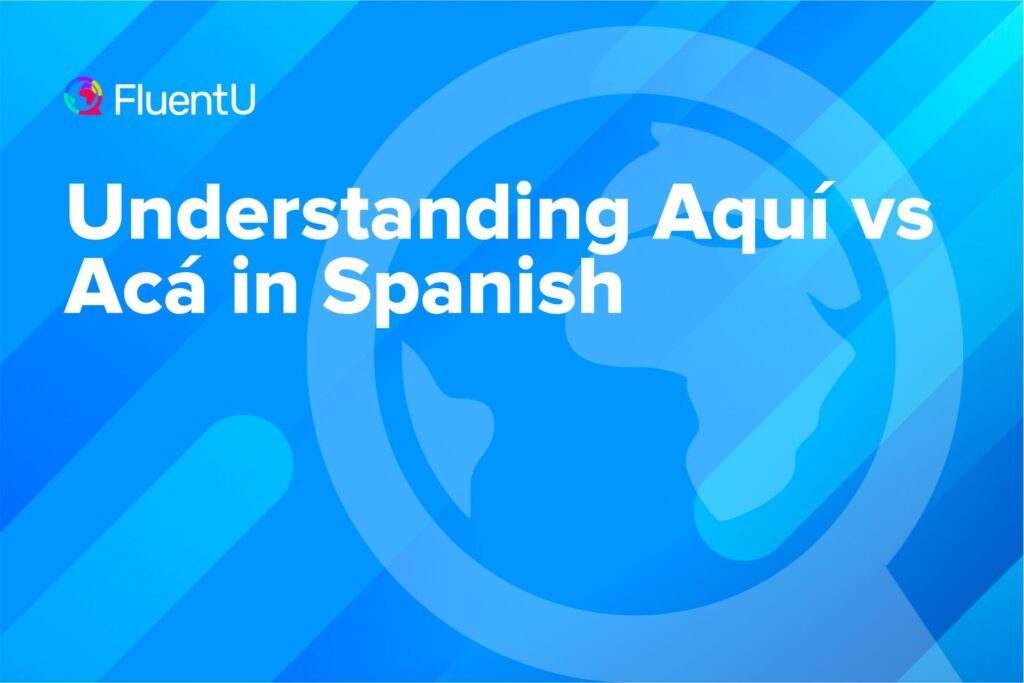Understanding Aquí vs Acá in Spanish

Aquí and acá can be pretty tricky for Spanish learners, because they both mean “here,” but there can be slight differences in their uses. So how do you know which word to use? And what about other similar words like ahí, allí and allá?
Here we’ll go through how to use different Spanish location words and when to fall back on aquí and acá.
Download: This blog post is available as a convenient and portable PDF that you can take anywhere. Click here to get a copy. (Download)
The Difference Between Aquí and Acá
Both aquí and acá can be used to mean “here,” either “in this place” or “toward this place.” Their meanings are so similar that they’re pretty much interchangeable, and their more specific nuances depend greatly on cultural nuances across regions.
For example, in Spain you’ll hear acá used with para to say “come (to) here,” like this: Tiene que venir para acá para la fiesta. (She has to come here for the party.)
Meanwhile, my Peruvian husband could tell me when aquí and acá sounded right or wrong, but couldn’t tell me exactly why.
There are no clear rules for which word to use and, generally, you can use either one and make perfect sense. Just pick one and stay consistent.
The best way to get a sense of when things “sound right,” the way my husband does is through exposure. Basically, the more authentic Spanish you consume, the better you’ll get at understanding when to use which word. This is true for so many Spanish concepts, not just aquí and acá.
If consuming real-world Spanish media seems daunting, FluentU can ease you into the process in an easy and natural way. The program is designed to help you understand real Spanish at any level.
FluentU takes authentic videos—like music videos, movie trailers, news and inspiring talks—and turns them into personalized language learning lessons.
You can try FluentU for free for 2 weeks. Check out the website or download the iOS app or Android app.
P.S. Click here to take advantage of our current sale! (Expires at the end of this month)

What Does Aquí Mean?
Aquí translates to “here” in English and it’s used to indicate physical or temporal location.
Here are some examples:
Estoy aquí.
— I’m here.
Ponlo aquí.
— Put it here.
Mira, ¡hay un gato aquí!
— Look, there’s a cat here!
De aquí en adelante, las cosas cambiarán.
— From now on, things will change.
Aquí can also be used to casually introduce someone. For instance:
Aquí está mi amiga Ángela. (Here is my friend, Angela.)
What Does Acá Mean?
The Spanish word acá means “here, close to the speaker.” But as I’ve said: It’s very similar to the word aquí and in many cases, the two words can be used interchangeably.
However, acá is more often used when the speaker and listener aren’t in the same place, but the thing you’re pointing out is near the person speaking.
Here are some examples:
Acá está mi libro.
— My book is here.
Ven acá.
— Come here.
Acá en España, la paella es muy popular.
— Here in Spain, paella is very popular.
Note that you can use aquí in any of the above cases and still be correct, but the nuance is a bit different. For instance you can say ven aquí but it sounds more like a command you’d use with a child, more informal.
Either way, you’ll be understood no matter which word you use.
More Location Words: Ahí, Allí and Allá
Spanish actually has even more location words than aquí and acá. Introducing ahí, allí and allá, all of which mean a variation of “there.”
How do you know when to use each word? Here’s a breakdown:
Ahí — There (close by)
Meaning: There (medium distance, within reach or sight)
Examples:
El teléfono está ahí, en la mesa. (The phone is there, on the table.)
¿Quieres sentarte ahí conmigo? (Do you want to sit there with me?)
Deja las llaves ahí sobre el mostrador. (Leave the keys there on the counter.)
Allí — There (further away)
Meaning: There (greater distance, further away, not necessarily within sight)
Examples:
Mira, mi casa está allí, al otro lado de la calle. (Look, my house is over there, across the street.)
Los niños juegan allí en el parque. (The children are playing over there in the park.)
¿Ves a María? Está allí saludando a alguien. (Do you see Maria? She’s over there greeting someone.)
Allá — There (farthest away, often metaphorical)
Meaning: There (far away, distant, often metaphorical)
Examples:
Vive muy lejos de aquí, allá en otro país. (She lives far away from here, over there in another country.)
En sus sueños, viajaba a lugares lejanos, allá donde todo era posible. (In her dreams, she traveled to faraway places, over there where everything was possible.)
No te preocupes, allá te estaremos esperando. (Don’t worry, we’ll be waiting for you over there.)
Review: Spanish Location Words Table
Feeling a little lost in all these location words? Here’s a helpful table summarizing the key differences:
| Word | Meaning | Distance | Example |
|---|---|---|---|
| Aquí | Here | Close | Aquí está mi libro. (My book is here.) |
| Acá | Here | Close | Acá hace calor. (It's hot here.) |
| Ahí | There | Medium | El teléfono está ahí. (The phone is there.) |
| Allí | Over there | Further | La casa está allí. (The house is over there.) |
| Allá | Over there | Far away | Vive allá en otro país. (She lives over there in another country.) |
Need to talk about things that are here, there or way over on the other side of the planet? Use one of these location words in Spanish!
And One More Thing…
If you've made it this far that means you probably enjoy learning Spanish with engaging material and will then love FluentU.
Other sites use scripted content. FluentU uses a natural approach that helps you ease into the Spanish language and culture over time. You’ll learn Spanish as it’s actually spoken by real people.
FluentU has a wide variety of videos, as you can see here:

FluentU brings native videos within reach with interactive transcripts. You can tap on any word to look it up instantly. Every definition has examples that have been written to help you understand how the word is used. If you see an interesting word you don’t know, you can add it to a vocab list.

Review a complete interactive transcript under the Dialogue tab, and find words and phrases listed under Vocab.

Learn all the vocabulary in any video with FluentU’s robust learning engine. Swipe left or right to see more examples of the word you’re on.

The best part is that FluentU keeps track of the vocabulary that you’re learning, and gives you extra practice with difficult words. It'll even remind you when it’s time to review what you’ve learned. Every learner has a truly personalized experience, even if they’re learning with the same video.
Start using the FluentU website on your computer or tablet or, better yet, download the FluentU app from the iTunes or Google Play store. Click here to take advantage of our current sale! (Expires at the end of this month.)





